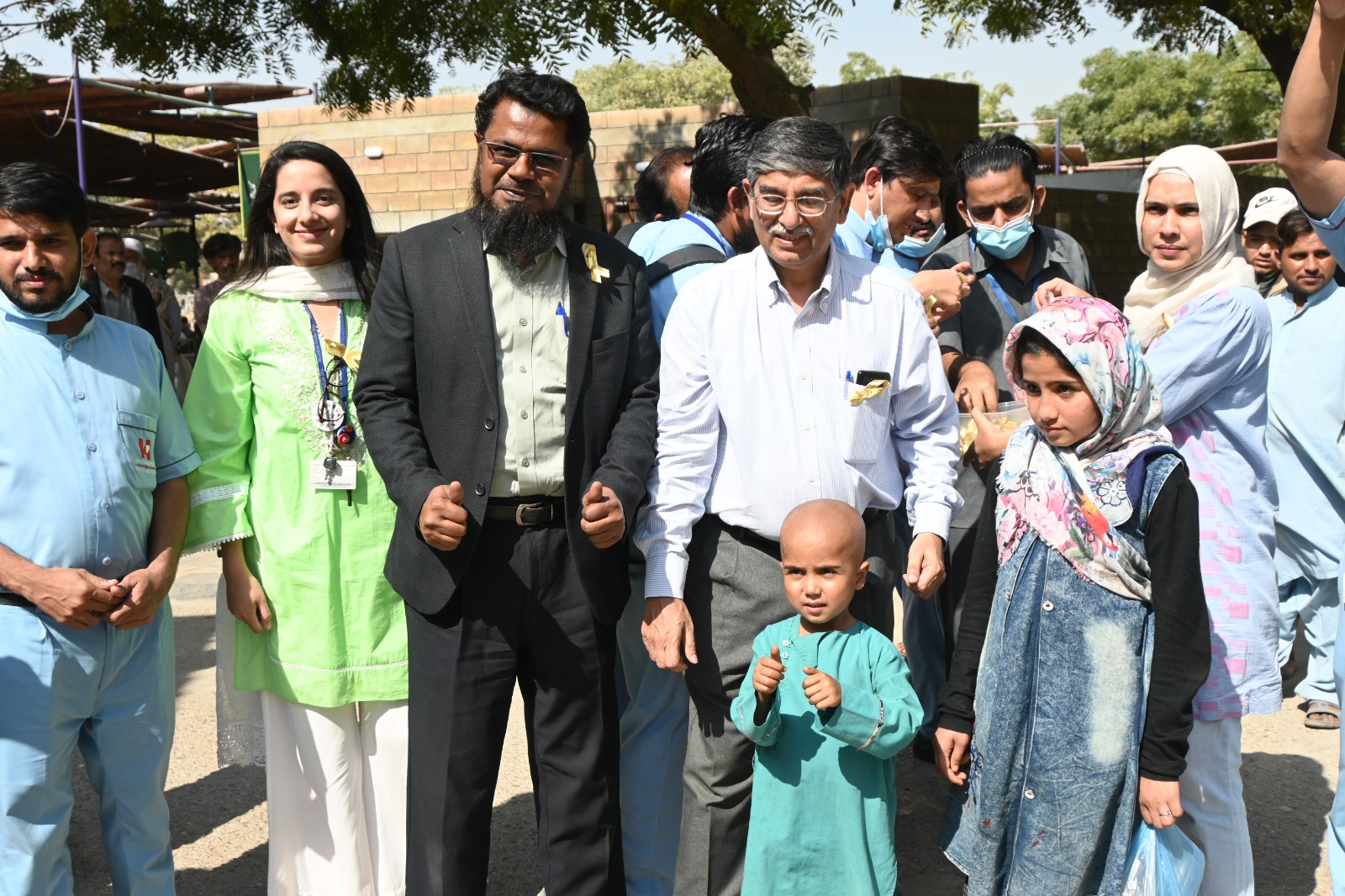IHHN Celebrates International Childhood Cancer Day (ICCD) 2023 | Sab Sitaray Humaray
In commemoration of International Childhood Cancer Day (ICCD) 2023, Indus Hospital & Health Network (IHHN) held several events to raise awareness of Childhood Cancer and celebrate the remarkable efforts of its brave young warriors. Celebrations took place over several days in collaboration with IHHN’s generous supporters.
Around 10,000 children are expected to get diagnosed with cancer every year in Pakistan. However, due to lack of access and unaffordability of treatment, approximately 70% of children diagnosed either abandon treatment or are unable to survive beyond 5 years of starting treatment.
IHHN is committed to providing free-of-cost, quality treatment to all childhood cancer patients indiscriminate of their race, class, creed, or background. Indus Hospital, Korangi Campus’s Pediatric Oncology services, a dedicated 85-bed facility started in 2014, in one of the largest pediatric cancer units in the region and a center of excellence. It comprises out-patient clinics, general wards, an oncology day care unit, a dedicated emergency unit, a covered outdoor play area, psycho-social & counseling services, and a hospital-based school ‘Indus Kay Sitaray.’ IHHN has also started satellite pediatric oncology clinics at District Headquarter Hospital, Badin in Sindh, and Sheikh Khalifah Bin Zayd Hospital in Balochistan to facilitate patients for early diagnosis and patients on maintenance.
To date, more than 12,00 children have been treated for cancer and blood diseases.
Mehendi Ke Taj | Empowering IHHN’s Childhood Cancer Patients
Karachi: Tuesday, February 14, 2023
Created by Sara Vazir, an international henna artist, ‘Mehndi Ke Taj’ is a non-profit initiative aimed at providing Henna Crowns and other confidence-boosting activities to empower children undergoing chemotherapy in Pakistan. In honor of ICCD 2023, “Mehendi Ke Taj” hosted a fun-filled event for pediatric patients at Indus Hospital, Korangi Campus. This was the 7th event held by Ms. Vazir at IHHN.
IHHN Childhood Cancer Awareness Walk | “Through Their Hands”
Karachi: Wednesday, February 15, 2023
The Pediatric Oncology Department & Psychosocial Department at the Indus Hospital, Korangi campus, organized a Childhood Cancer Awareness Walk to commemorate ICCD 2023. The event aimed to spread awareness about childhood cancer and promote better survival rates for children with cancer. In addition, the walk helped highlight the crucial role caregivers, families, and healthcare professionals play in the fight against childhood cancer.
In addition, Khugarz – an all-boys band from Karachi, Pakistan – visited the hospital on ICCD 2023 to raise awareness about childhood cancer, and to express support for children and adolescents with cancer, the survivors, and their families. The band entertained the children with songs, games, and arts & crafts activities, and also toured Indus Kay Sitaray – IHHN’s hospital-based school.
Quetta: Wednesday, February 15, 2023
IHHN’s Pediatric Oncology Unit at the Sheikh Khalifa bin Zayed Hospital celebrated ICCD 2023 with senior leadership from IHHN, distinguished outside guests, and the hospital’s staff, healthcare professionals, patients, and their caregivers. All enthusiastically participated in the celebrations, which included a Cancer Awareness Walk.
Speaking at the event, Dr. Shamvil Ashraf, Executive Director, Medical Services Directorate, IHHN, noted the impact of IHHN’s Pediatric Oncology Unit (POU) operating in Sheikh Khalifa bin Zayed Hospital, Quetta. The POU was established in 2021 under a public-private partnership with the Government of Balochistan and offers inpatient care, outpatient consultations, daycare, and routine procedures. The unit is serving the residents of Balochistan with free-of-cost, quality cancer treatment at their doorstep. Before the establishment of the POU, patients from Balochistan would have to travel all the way to Karachi to receive care.
IHHN & Pakistan Super League 2023 | Turning Gold to Bowl Out Cancer!
Karachi: Thursday, February 16, 2023
In commemoration of ICCD 2023, the Pakistan Cricket Board (PCB) and Pakistan Super League (PSL) invited IHHN’s childhood cancer patients to the PSL 2023’s 4th match: Karachi Kings vs Islamabad United, where they were able to meet their favorite players and cheer them on throughout the game.
Moved by the journey of these remarkable cancer survivors, the players from PCB handwrote messages of hope to IHHN’s childhood cancer patients, acknowledging their bravery and encouraging them to never give up in their fight against cancer. IHHN is grateful to the PCB, PSL, and all those involved in bringing joy and smiles to the faces of these precious children battling cancer.
Indus Yaqeen Celebrates ICCD 2023
Karachi: Thursday, February 16, 2023
Indus Yaqeen – IHHN’s youth engagement program – held a childhood cancer awareness session at DHA College & School System (DHACSS) Tooba Campus. The session was attended by the school’s students, faculty, and management.
Several educational institutes supporting IHHN also engaged their students in commemoration of ICCD 2023. Within each school, the students created an artistic painting depicting a “Tree of Hope.” The activity served to raise awareness among the students about childhood cancer and was also an expression of solidarity with the pediatric patients at IHHN suffering from cancer. The paintings will be compiled, framed, and displayed at IHHN’s pediatric wards.




